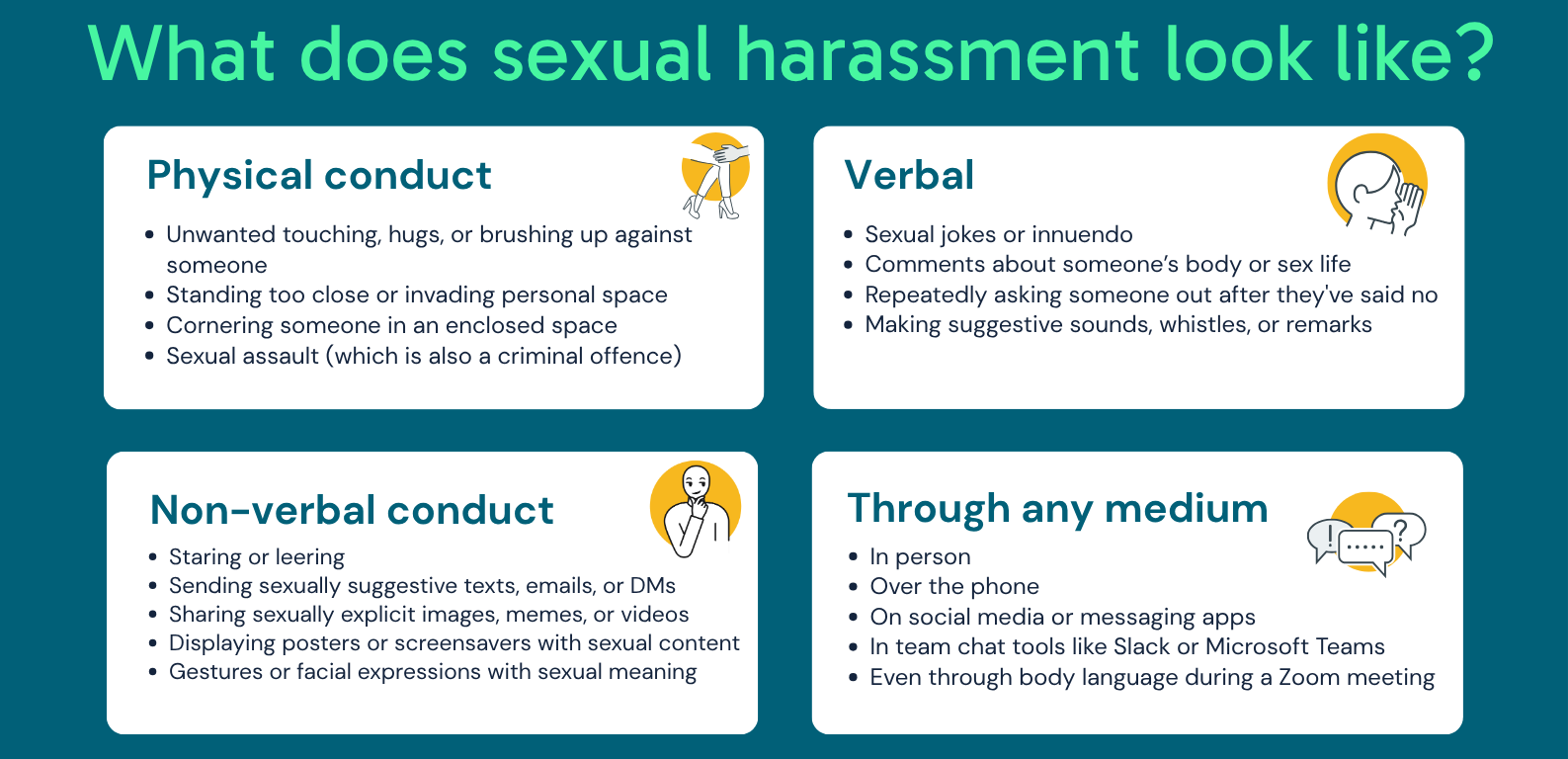The Respect Belongs in This Workplace campaign delivered in partnership with Tasmanian Chamber of Commerce and Sexual Assault Support Service supports Tasmanian employers, employees, and industry leaders to take meaningful action to prevent and respond to workplace sexual harassment.
This campaign raises awareness of what constitutes sexual harassment in the workplace and promotes clear, accessible pathways for reporting concerns or making complaints.
RECOGNISE THE BEHAVIOURS
Workplace sexual harassment is any unwelcome sexual behaviour that makes a person feel offended, humiliated, or intimidated, where a reasonable person could expect that reaction in the same situation.
It can happen to anyone, by anyone, and in any type of workplace — from offices and sites to online meetings or social events.
Workplace sexual harassment can be verbal, non-verbal, physical, in person or online.
Knowing the behaviours helps to:
- Prevent harm before it happens by identifying harmful behaviours early.
- Support safer reporting, because staff can name and describe what’s not okay.
- Build accountability, as leaders and teams share a common understanding of respectful conduct.
Examples include:
- Unwelcome touching, hugging, or sexually suggestive gestures
- Comments or jokes about someone’s body, appearance, or private life
- Staring, leering, or sending sexualised messages or images
- Repeated unwanted invitations or attention
- Standing too close or invading someone's personal space
- Intrusive questions about someone’s private life or appearance

It doesn’t matter whether the behaviour was intended as a joke, compliment, or part of “workplace banter” — if it’s unwelcome and makes someone feel uncomfortable or unsafe, it can be sexual harassment.
KNOW WHO TO TELL
Reporting workplace sexual harassment isn’t just about responding after harm has occurred— it’s one of the most powerful ways to prevent it occurring in the future.
When people speak up — even about behaviours that might seem subtle or easily dismissed — it gives workplaces the opportunity to act early, before patterns of disrespect escalate.
Telling someone — either formally or informally — helps your workplace to:
- Identify patterns early and stop behaviours before they cause further harm
- Strengthen culture and accountability, showing that disrespect and harassment in all its forms are not tolerated
- Protect others, because reporting helps ensure the same behaviour doesn’t happen to someone else
- Inform prevention strategies, training, and policy improvements for the workplace
When incidents go unreported, they remain unseen — and what goes unseen cannot be changed. When people feel safe to report either formally or informally, leaders can fulfil their legal duties and build a genuinely respectful culture. <link to employer page?>
If you are a victim
If you are a victim of workplace sexual harassment, you have a choice about who you tell or seek support from. No one can force you to make a formal complaint – reporting your experience informally or formally, named or anonymously, are all options you can consider. Click here for more employee resources.
If you are a witness
If you witness harmful or unlawful behaviours, you can encourage and support the victim to make a complaint, provide them with information, assist them to document the incident and be a witness or support person.
You can also raise the issue internally within the workplace: report to the employer, WHS officer, manager or HR. As a witness to the unlawful behaviour you can make a complaint if the behaviour impacted you or your safety and wellbeing in the workplace. Under WHS laws the employer has a duty to manage risks (including harassment) and to provide a safe workplace. Ideally you would discuss this with the victim and discuss the best course of action, however as the organisation has a legal obligation to prevent harm from occurring and manage workplace health and safety risks and hazards, you can make a report internally if it is safe to do so.
Everyone can make a difference.
GET INVOLVED
It’s how we act, lead, and respond — in every meeting, message, interaction, and decision.
Everyone can make a difference.
With the right support, everyone can take a role in creating safer workplaces. Champions of Change coalition have created a practical guide on how individuals, teams and organisations can be proactive and practical strategies for being an ‘upstander’ – someone who actively disrupts sexual harassment in their workplace.
Download the guide.
Respect belongs in this workplace. Sexual harassment does not.
Educate Your staff, empower culture change
SASS provides a range of training packages to support leaders, managers and employees to make positive change in their workplace.
Learn more about SASS Positive Duty for Leaders training here.
Download and Display
Help make respect visible at work.
Download the campaign posters (at the bottom of this page) - ready to print and display across worksites, lunchrooms, and offices to support staff to recognise the behaviours and know who to report a concern to.
For Employees
Learn more about your rights and responsibilities as an employee, what to do if you've experienced or witnessed a workplace incident and where to go for support.
For Employers
Learn more about your responsibilities as an employer including Positive Duty, WHS risk, responding to complaints and where to find further support and advice.
DOWNLOAD POSTERS
Click to download a printable version of the poster.
SASS and TCCI are proudly working together to prevent sexual harassment in Tasmanian workplaces.

Disclaimer: The information provided on this website is for general guidance and educational purposes only. It does not constitute legal advice and should not be relied upon as such. While we aim to ensure the content is accurate and up to date, laws and regulations may change and individual circumstances vary. You should seek independent legal or professional advice relevant to your specific situation before taking any action based on the information provided on this site. We accept no responsibility for any loss or damage that may arise from reliance on this information.

.png)
.png)
.png)
.png)
.png)
.png)
.png)
.png)
.png)